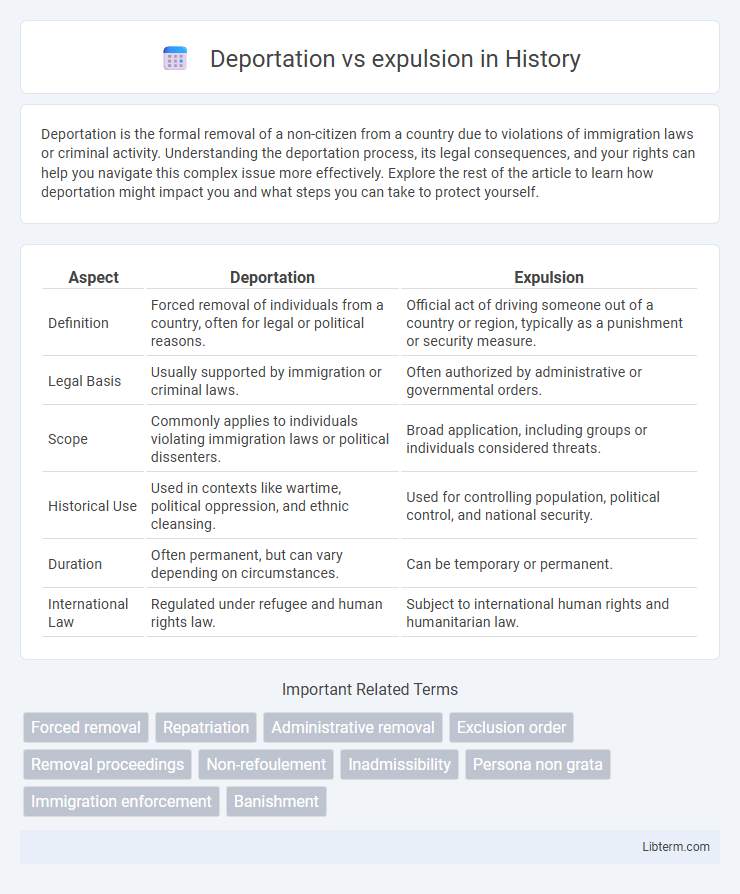Deportation is the formal removal of a non-citizen from a country due to violations of immigration laws or criminal activity. Understanding the deportation process, its legal consequences, and your rights can help you navigate this complex issue more effectively. Explore the rest of the article to learn how deportation might impact you and what steps you can take to protect yourself.
Table of Comparison
| Aspect | Deportation | Expulsion |
|---|---|---|
| Definition | Forced removal of individuals from a country, often for legal or political reasons. | Official act of driving someone out of a country or region, typically as a punishment or security measure. |
| Legal Basis | Usually supported by immigration or criminal laws. | Often authorized by administrative or governmental orders. |
| Scope | Commonly applies to individuals violating immigration laws or political dissenters. | Broad application, including groups or individuals considered threats. |
| Historical Use | Used in contexts like wartime, political oppression, and ethnic cleansing. | Used for controlling population, political control, and national security. |
| Duration | Often permanent, but can vary depending on circumstances. | Can be temporary or permanent. |
| International Law | Regulated under refugee and human rights law. | Subject to international human rights and humanitarian law. |
Understanding Deportation: Definition and Scope
Deportation refers to the formal removal of a foreign national from a country due to illegal presence or violation of immigration laws, typically initiated by government authorities. It encompasses a legal process including detention, hearings, and orders issued by immigration courts or officials. The scope of deportation covers unauthorized entry, visa overstays, criminal offenses, and threats to national security, distinguishing it from broader terms like expulsion, which may include diplomatic or political removals.
Expulsion Explained: Key Concepts
Expulsion involves the formal removal of a person from a specific area or country, usually due to legal, administrative, or security reasons, differing from deportation which often follows immigration violations. Key concepts in expulsion include the authorized authority's decision, procedural fairness, and the individual's right to appeal. Understanding expulsion requires recognizing its legal basis, purpose to maintain public order, and impact on the expelled person's legal status.
Legal Frameworks Governing Deportation
Legal frameworks governing deportation are primarily established through national immigration laws, international treaties such as the 1951 Refugee Convention, and bilateral agreements between states. Deportation involves the formal removal of a non-citizen due to violations like illegal entry or criminal activity, distinct from expulsion which may arise from diplomatic or security concerns under broader state sovereignty rights. These frameworks ensure procedural safeguards including the right to appeal and protection against refoulement, aligning enforcement with human rights obligations.
Legal Basis for Expulsion Procedures
Expulsion procedures are grounded in international law and specific national statutes that authorize the removal of individuals for reasons related to public order or national security, differing from deportation which primarily addresses immigration violations. Legal frameworks such as the European Convention on Human Rights and the UN Refugee Convention impose strict conditions, including the right to a fair hearing and protection against refoulement, ensuring expulsions comply with human rights obligations. Courts often scrutinize expulsion decisions to balance state sovereignty with individual rights, emphasizing proportionality and due process in legal assessments.
Main Differences Between Deportation and Expulsion
Deportation refers to the formal removal of a foreign national from a country due to violations such as illegal entry, overstaying visas, or criminal activity, often following legal proceedings. Expulsion typically involves the removal of non-citizens on grounds related to national security, public order, or diplomatic reasons, sometimes without extensive judicial process. The key difference lies in deportation's emphasis on immigration law enforcement versus expulsion's focus on state sovereignty and security concerns.
Grounds for Deportation: Common Causes
Grounds for deportation commonly include violations such as overstaying a visa, committing serious crimes, or engaging in fraud during the immigration process. National security concerns and involvement in terrorist activities also frequently serve as legal bases for deportation. Immigration authorities typically conduct thorough investigations to confirm any grounds before initiating deportation proceedings.
Reasons for Expulsion: Typical Scenarios
Expulsion often occurs due to violations of university policies, repeated misconduct, or failure to meet academic standards, resulting in removal from the institution. It can also be enforced for criminal behavior on campus, threatening the safety or well-being of the academic community. Unlike deportation, which is government-initiated for immigration violations, expulsion is an administrative action tied specifically to educational policies.
Rights and Protections of Individuals Facing Deportation
Individuals facing deportation are entitled to due process rights, including the right to a hearing before an immigration judge and the ability to present evidence and legal arguments. Protections under international law, such as the principle of non-refoulement, prevent deportation to countries where individuals risk persecution, torture, or threats to life. Expulsion, often a more immediate administrative action without formal judicial review, may limit these protections and reduce the opportunity for individuals to contest the decision or seek asylum.
Rights and Legal Recourse in Expulsion Cases
Expulsion cases often involve immediate removal orders based on national security or public order concerns, with limited access to legal recourse compared to deportation cases, which typically allow for appeals and judicial review. Individuals facing expulsion have restricted rights to contest their removal, including shorter deadlines for filing appeals and limited access to legal representation. Courts and international bodies emphasize the need for fair procedures, but the scope of rights in expulsion cases remains narrower, impacting the ability to challenge the legality of the expulsion effectively.
International Implications: Deportation vs Expulsion
Deportation involves the forced removal of non-citizens by a state due to legal violations, with direct impacts on bilateral relations and international human rights obligations. Expulsion, often broader and sometimes applied during armed conflicts or political crises, can trigger disputes under international law, particularly regarding the protection of refugees and asylum seekers. Both actions affect state sovereignty and cooperation within global frameworks like the United Nations and regional human rights bodies.
Deportation Infographic

 libterm.com
libterm.com